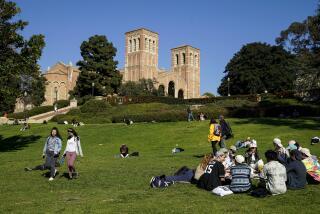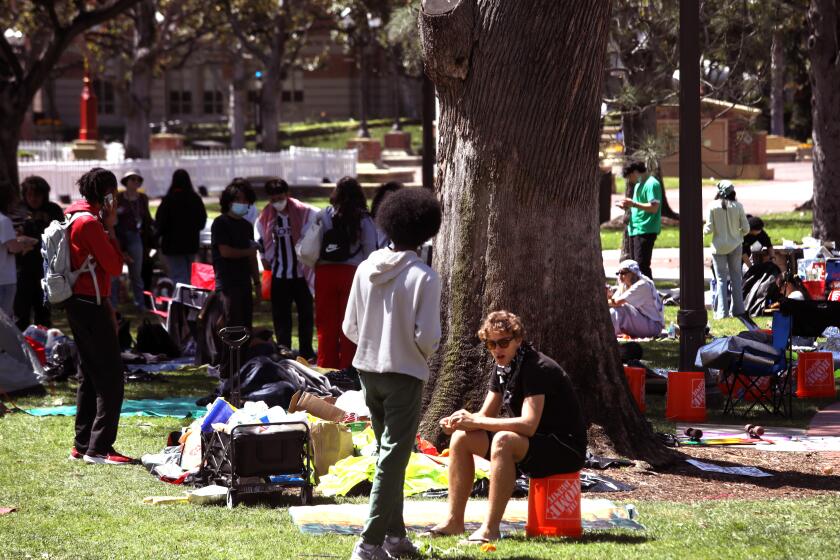Bills aim at pricey college textbooks
The high price of college textbooks is a hot issue, not just among disgruntled students weary of spending more than $100 on an economics or a chemistry tome. In Sacramento political circles, efforts to lower those costs have produced two pieces of legislation that are competing for Gov. Arnold Schwarzenegger’s signature.
The main authors of both are Democrats, and the two legislators say they are trying, among other things, to get more advance information to college professors about the pricing of books and whether additional material in new editions is substantial enough to merit ordering them. Requiring new editions makes it tough for students to buy or trade cheaper secondhand copies.
But the two bills vary enough that one has the support of the Assn. of American Publishers and the other is backed by the California Public Interest Research Group, which has sharply criticized the publishing industry.
The Republican governor has until Oct. 12 to decide whether to sign one, both or neither of the bills. Schwarzenegger has not taken a position on the matter, according to his press office.
The College Textbook Affordability Act, SB 832, written by state Sen. Ellen Corbett (D-San Leandro), was being advocated by CalPIRG in a series of meetings last week at college campuses, including USC and UC Santa Barbara.
The bill requires publishers to provide faculty a price list of all books in a subject area, an estimate of how long the publisher intends to keep the texts on the market and a list of substantive changes the newest editions contain. Those lists would also be posted online.
Corbett said her bill was influenced by her own difficulties in finding out about book pricing and edition information when she taught political science in Chabot-Las Positas Community College District in Northern California.
“I had to dig for the costs,” she said. Getting easily accessible information to faculty “could have a huge impact” on what books students are required to read, she said.
The other bill, AB 1548, whose main author is Assemblyman Jose Solorio (D-Santa Ana), is called the College Textbook Transparency Act.
It requires that publishers print on or in new texts a summary of differences between the current and previous editions and provide faculty, upon request, a printed or online list of wholesale prices and edition changes.
Under Solorio’s bill, campus bookstores at public universities would have to disclose their retail pricing policies. It also prohibits anyone from receiving anything of value in exchange for ordering a certain book. And it restricts the resale of instructors’ editions, because those contain test samples and answers. Teachers would then want new editions with different tests.
Solorio said his bill was shaped in part by his days at UC Irvine, where he was student body president and knew firsthand how difficult it was to afford textbooks. He wants to focus not just on publishers but also to address the practices of college bookstores and faculty.
“I’m holding everybody accountable,” he said, describing his bill as more comprehensive than Corbett’s.
Solorio said he voted for Corbett’s bill, though she abstained on his. He added that he would be happy if the governor signed either one.
“I just want to ensure over time that the price of textbooks comes down,” Solorio said.
In addition to the publishers’ group, his bill has the support of the California Postsecondary Education Commission and the California State Student Assn., among others, according to analysis provided by the Legislature.
CalPIRG, which sponsored Corbett’s bill, contends it is the better legislation because it requires lists of prices and editions to be posted on websites; listing such information on the Internet is optional in Solorio’s bill. The requirements of Corbett’s bill would go into effect upon signing, while many of the required disclosures in Solorio’s bill would not go into effect until 2010, student activists point out.
Sahil Chaudry, president of USC’s undergraduate student government, was among speakers at a campus event last week urging the governor to sign Corbett’s bill. Other supporters include the UC Student Assn., the California State Student Assn. and the Community College League of California, according to legislative analysis.
Bruce Hildebrand, the publishers association’s executive director for higher education, said his organization strongly opposed Corbett’s bill. He predicted it would actually cause prices to rise, partly because of what he called its unnecessarily broad requirements for price and edition change reporting. Much of that material is already available on the Internet, he said.
CalPIRG’s sister organization in Massachusetts said it surveyed nearly 300 professors in that state last year and found that book prices were not easy to find. For professors who met with sales representatives, 77% said those salesmen rarely or never volunteered the price. Of those professors who use publishers’ websites to research textbooks, less than half said those sites typically list prices.
In 2004, a CalPIRG survey reported that students in California and Oregon spent an average of $898 a year for books and that the average cost of a new textbook was $102.44. Student leaders said they expected those figures to have risen significantly since then. A federal report two years ago said that college textbook prices had climbed at twice the rate of inflation over the last two decades.
A wide range of efforts are afoot across the country to tame price increases. Some schools offer students the option of renting books and have organized book swaps and websites that offer secondhand texts. In May, an advisory committee to Congress recommended a variety of measures to control textbook costs, including more extensive use of books available on the Web.
--
More to Read
Get the L.A. Times Politics newsletter
Deeply reported insights into legislation, politics and policy from Sacramento, Washington and beyond. In your inbox three times per week.
You may occasionally receive promotional content from the Los Angeles Times.







